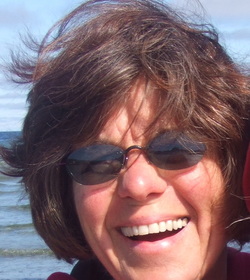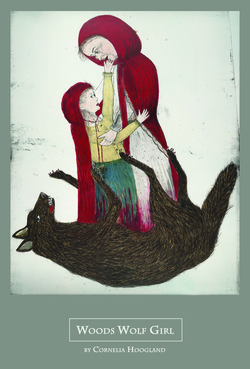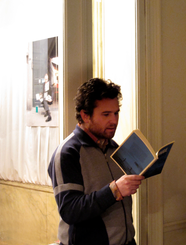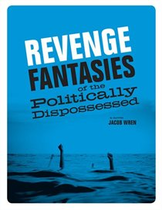 Cornelia Hoogland Cornelia HooglandPhoto by Hennie Aikman Woods Wolf Girl (Wolsak and Wynn, 2011) is CORNELIA HOOGLAND'S 6th book of poetry, and is based on the fairy tale, Red Riding Hood. Fountainhead Theatre in London Ontario is producing Red’s Canadian premiere in May 2013. Hoogland’s poetry, as well as her nonfiction, fiction and plays have been published and performed internationally. Cornelia has received writing awards from the Canada Council, Ontario Arts Council and selections from her 6 books of poetry, two chapbooks and nonfiction have won numerous literary competitions and have been shortlisted for various CBC literary competitions, the Relit awards, and the National Magazine Awards. Cornelia has taught writing and literature at the University of Western Ontario, UBC Okanagan, Simon Fraser University, and has led seminars, workshops and tutorials at festivals and school districts. She lives on Hornby Island with her visual artist husband Ted Goodden and dog Drummer. Visit Cornelia online at her website, at her Woods Wolf Girl site, and on Facebook. RUSTY TALK WITH CORNELIA HOOGLAND Kathryn Mockler: What is your first memory of writing creatively? Cornelia Hoogland: I remember tracing the colour blue from its starting point above the clouds, to the mountains, the ocean, the Douglas-fir trees, grains of sand, the beach towel and then the colour splintering into my child’s blue eyes. Speaking of one thing in terms of another – what a miracle is metaphor. The blue poem took place at Rathtrevor Beach on Vancouver Island 35 years ago. I lost that poem and yet—have lived it all these years. Following where the line, idea, colour, word takes me. KM: Why did you decide to become a poet/writer? CH: I received my first diary—one inch by two inches—when I was six. I wrote “Dad bought me a comic.” I am a journal keeper still. Every morning I get up and try to scratch out a few fresh lines. At the Banff Centre for the Arts, Adele Wiseman told my group: “You are all professionals; you’ve all sacrificed to be here in this program. You can call yourself a poet.” Okay, I thought. KM: Who are you reading now? CH: Dean Young, Tony Hoagland, Elizabeth Bishop and many other American poets both living and dead. Canadians Nancy Holmes, Julie Berry, Matt Radar. Alice Oswald, Jack Gilbert, David Harsent writers I admire. My daily literary experiences are often online, however. I read Poetry Daily and follow up the poems onto the Amazon or Google sites where I can read (often) more poems. KM: What do you feel influences your writing the most? CH: My antenna for lines, images, verbs, rhythm, dynamics, juxtaposition. Always on the look-out for the next poetic bread crumb. Reading and hearing other poets, and listening to children. Children say the best things, but I have a long ways to go to hear them properly. I also attend to wolves, dogs, crows. Learning how to write nature poetry, or use natural images, is one of our biggest literary challenge today. KM: Can you describe your writing process? How does revision figure into the process? CH: In writing and editing Woods Wolf Girl (Wolsak and Wynn, 2011), I realized more deeply than I did before the complex relationship between experience and form. Although the poems were written as monologues (Red, Mother, and the Woodsman), finding their voices was by way of delving more deeply into my own. KM: What is the best piece of writing advice you’ve been given that you use? CH: Understanding that poetry is a set of strategies (such as pattern, affect, density). Poetry doesn’t exist to teach us how to live (although it might) or even to show us the world we inhabit (though it might). Poetry is the dynamics of released energies, a dramatization of shaped energies. KM: What is your favourite or funniest literary moment, if you have one? CH: As the director of Poetry London in London, Ontario, I experienced many hilarious moments. Despite detailed emails to visiting poets outlining the program, the expectations, the times, directions and so forth, actually getting the writers from their cities to the London podium could involve tens of emails, an intricate cell phone game the days before and of the reading, great poetic anxiety about directions and schedule, food sensitivities revealed once seated at the restaurant, amazing requests to be driven to antique shops or delicatessens, and so forth. What I loved was the moment said famous authors walked on stage, they were immediately professional, engaging, charming, mannered and poised. The audience loved each of them; in fact, the more troublesome ones were the most sensational! Amazingly, hosts across Canada do similar work on any given night of the week and all for free. KM:Tell us about your play, Red. CH: Red is having its Canadian premiere on May 10–18, 2013, in London Ontario. Fountainhead Theatre is producing the play (John Gerry, director). Tickets available at onstagedirect.com I started writing the play using scenes from Woods Wolf Girl, but the play quickly took on a life of its own and bears little resemblance to the book. Red Riding Hood’s multiple identities throughout the ages, and the plethora of attitudes toward her inform this play. Innocent, sexual, chaste, (chased), unchaste, the girl to blame, fearless, the girl who ‘asked-for-it’, Red (the girl) is also the wolf, the wilderness is inside her. The character Red is not limited in costume, posture, attitude, or age. Arguably the world’s most popular, and most retold, fairy tale, interpreted into countless versions in over 40 different countries over the past nearly 400 years, it transcends cultural barriers. Red takes up complex human concerns, such as how good girls grow up, relationships between mothers and daughters, and the ongoing tensions between agent/victim, eating and/or being eaten. Who is caged, who is protected? (This play is suitable for high school audiences and adults.) For more information please see http://www.facebook.com/cornelia.hoogland. KM: What are you working on now? CH: Once again I am turning to the fairy tale for my inspiration. My multimedia project titled Woods Wolf You: A SoundWalk, is an audiowalk through the woods. Aimed to help create ecological awareness in young people as well as feelings of connectedness—ironically using the very technology (personal stereos) often blamed in alienating people from the physical world—the audio walk conjoins the technologies of sound, the power of the fairy tale Red Riding Hood, and site-specific performance. I’m delighted that London’s own Baseline Press will be publishing my chapbook, Sea Level, in 2013. Sea Level was shortlisted for the CBC literary nonfiction awards in 2012. Karen Schindler is creating one of the most exciting chapbook presses in Canada, and I’m delighted.  CORNELIA HOOGLAND'S RECENT POERTY BOOK Woods Wolf Girl, Wolsak and Wynn, 2011 From the Publisher: Cornelia Hoogland takes the story of Little Red Riding Hood and turns it inside out in this sensuous Canadian retelling. The woods and wolves are vivid and real, while Red herself is anything but a one dimensional girl-child. A meditation on innocence and its loss, and on the power of the green wilderness, Woods Wolf Girl uses striking lyric poetry to expose the heart of the original fairy tale. About Woods Wolf Girl: “Red Riding Hood like you’ve never encountered her before. Hoogland has nailed it in this chilling contemporary retelling of the age-old tale. Layered and smart as hell.” (Jeanette Lynes). Woods Wolf Girl is an arresting new book of poems from Cornelia Hoogland. The plot that threads through the poems draws from Red Riding Hood, but the story is ultimately Canadian. It is a lyrical work that exposes the wilderness of the Canadian landscape to a new immigrant, and shows the equally dangerous transition from girlhood to womanhood. Woods Wolf Girl retells the journey from mother’s house to grandmother’s house through the woods from the points of view of the girl and her immigrant mother. These poems occur on the path of experience: experience that may lurk in the form of wolf/men--who are especially dangerous to good girls. While the wolf is ultimately bad news (and then simply tired news, as in the scene in the grocery store), he initiates the girl into experience, the good with the bad.  Jacob Wren Jacob WrenPhoto by Brancolia JACOB WREN is a writer and maker of eccentric performances. His books include: Unrehearsed Beauty, Families Are Formed Through Copulation and Revenge Fantasies of the Politically Dispossessed. As co-artistic director of Montreal-based interdisciplinary group PME-ART he has co-created the performances: En français comme en anglais, it's easy to criticize (1998), the HOSPITALITÉ / HOSPITALITY series including Individualism Was A Mistake (2008) and The DJ Who Gave Too Much Information (2011) and Every Song I’ve Ever Written (2012). He travels internationally with alarming frequency and frequently writes about contemporary art. RUSTY TALK WITH JACOB WREN Kathryn Mockler: What is your first memory of writing creatively or being creative? Jacob Wren: I don’t know if I have a first memory. But I do know around age thirteen I started suffering from terrible insomnia. Some nights I didn’t sleep at all, while most nights I slept very little. And basically I just filled the endless, sleepless nights with reading and writing, for more or less ten years, until I realized that the simple cure for my insomnia was rigorous physical exercise. Still, to this day, I associate writing with the strange, hallucinatory state that comes from having barely slept for weeks on end, as a kind of unreal trance, almost like a dream. It was during those nights, lying awake, almost too tired to move, that I first trained myself to write. KM: Why did you become an artist/writer and what keeps you going? JW: To be honest, the only thing that has ever really interested me was art (in all its many forms.) I wish I could become interested in something else, since I feel, as a human being, at times this overemphasis on artistic interests makes me a bit narrow, as well as making my interactions with other people often rather difficult. (I mean, I do my best.) At the same time, I find it very hard to maintain any interest in art and often don’t know exactly what keeps me going (except that I have no idea what else I could possibly do). Sometimes I remind myself a bit of this apocryphal story of a Russian who moved to New York but never learned English. Gradually, over the course of his life, he forgot how to speak Russian, yet still never learned English, so in the end he spoke no language at all. Gradually I am becoming less and less interested in art, while not really becoming interested in anything else, so in the end I’m kind of nowhere. Like a priest who has lost faith. But that makes it all sound more dire than it actually is. Still, I think it’s important that we talk about these things, since hardly anyone ever does. I have often said that I don’t particularly relate to people who make performance, or write, or make art, but I do relate to people who make performance / writing / art who think about quitting every fifteen seconds. Those are really my people. I call us the ‘boy who cried wolf set’. Because, for me, if you really look at art today, at what it means, at who it reaches, at what is considered successful or important, it often seems like a complete waste of time. If I had any talent for it, or drive towards it, I would definitely quit art and become an activist, since the world’s problems are now so overwhelming, immediate and tragic. But, for better or worse, I can’t seem to get myself to do anything else: all I can really do is write. (Well, I also make performances, but that becomes harder and harder as the years roll on.) KM: How would you describe your writing process? How does your blog A Radical Cut in the Texture of Reality fit into this process? JW: I mainly feel like I don’t really have a process. I just have ideas and write them down to the best of my ability. Often I try to write every morning, but then, at other times, I am stuck for months on end and write very little. I usually do a first draft in a notebook, and then type it up as I go. Sometimes there is a little bit of re-writing as I type it into the computer, but mainly the second draft just allows me to think more about what I’m doing. I definitely started my blog, in 2005, because I had almost completely stopped writing and was looking for a way to start again. It’s always been difficult for me to get published—I suppose what I write doesn’t quite fit anywhere (maybe it’s a little bit easier now, I’m not sure)—but at the time being able to just post what I was writing on my blog, as I went along, gave me more of a feeling that I was actually doing something. I would tell myself: just write one paragraph and post it, then at least you will have written one paragraph. It kind of made me feel like writing was possible again, after having felt it was basically impossible for many years. (Mainly due to too many rejection letters, or more precisely to the fact that I’m a little bit too sensitive to such things.) Now my blog gets about 2,000 hits a month, so that must mean someone is reading it, but I don’t really have any sense of who is reading it, why, or what they think. There are hardly any comments. I spend so much time on the internet (mainly on Facebook and listening to music), and I know this has deeply affected how I think about art, about writing, and also how I practice it. It is difficult for me to really analyze what this change might be, it has all been so natural and intuitive, but I know there is something about the shuffle feature on iTunes, and about the seeming randomness as one clicks from one link to the next, that has been completely folded into my aesthetic. KM: What or who influences your writing? JW: I keep an ongoing list of favourite books: Some Favourite Books And recently I have added a list of visual artists: List of Artists But mainly I just want to devour everything. I want to have an overview. I want to know what is happening in art today, and everything that has ever happened in art before, and I want to use all of it while at the same time making it my own. I want to speak about the world, about the world today and about history, about ideas, thinking, philosophy, theory, and about my own subjective experiences. I want to struggle with it, admit to failure, be upset that I am not as good as the artists and authors I love but keep trying. I wish the mainstream was more open and more interesting. KM: Can you discuss the relationship between writer and reader or audience? Who would be your ideal reader? I’m interested also in terms of your blog and its readership. Does that audience inform your work in any way? JW: I have a sort of double life, half writing, the other half performing. When you perform the audience is right there in front of you, and all of my performance work is about trying to honestly deal with the fact that the audience is right there in front of me, about the paradox of trying to be yourself in the deeply unnatural situation of a room full of strangers watching you. I’ve always like the Gertrude Stein quote: “I write for myself and strangers.” When I was revising my last book, I showed it to a bunch of friends for comments, and I listened to all of their comments, and later, when the book came out, realized I had completely ignored basically all of their suggestions. I had asked for their help, and then completely ignored everything they said. (Well, I’ve always been stubborn.) And I feel this is so often the way between me and readers, I listen to every comment I get, think about it, try to take it in, fully absorb it, but never directly respond to anything anyone says. Nonetheless, I very much hope it is all in there anyway, somewhere in my head, affecting what I think, how I see what I’m doing, in some completely indirect way making the work better. KM: What is the best piece of literary advice you’ve gotten that you actually use? JW: As I’ve already suggested, I’m so bad with taking advice. But I really liked reading what Alain Badiou once said in an interview. He said the only rule for activism is: keep going. And I guess that’s mainly what I try to do now, keep going, which also means not making too many compromises, trying to offer up something different enough from everything else out there, trying to see the world a different way and put it into words. But, then again, I also constantly want to quit. Which is maybe why the advice is so important. Keep going. KM: What is your favourite or funniest literary moment, if you have one? JW: I actually can’t think of anything at the moment. Hopefully that means there are many favourite, hilarious literary moments to come. Maybe the future will be full of them. KM: What are you reading at the moment? JW: I just started reading The Empire Within: Postcolonial Thought and Political Activism in Sixties Montreal by Sean Mills. I believe I must be reading it because I live in Montreal. So far it’s fascinating. KM: What projects are you working on in 2013? JW: I am writing a new book entitled Polyamorous Love Song. Here is a short synopsis: It is a book of many different narrative through-lines. For example: 1) A mysterious group, known as The Mascot Front, who wear furry mascot costumes at all times and are fighting a revolutionary war for their right to wear furry mascot costumes at all times. 2) A movement known as the ‘New Filmmaking’ in which, instead of shooting and editing a film, one simply does all of the things that would have been in the film, but in real life. This movement has many adherents. Its founder is known only as Filmmaker A. 3) A group of ‘New Filmmakers’, calling themselves The Centre for Productive Compromise, who devise increasingly strange sexual scenarios with complete strangers. They invent a drug that allows them to intuit the cell phone number of anyone they see, allowing phone calls to be the first stage of their spontaneous, yet somehow carefully scripted, seductions. 4) A secret society that concocts a sexually transmitted virus that infects only those on the political right. They stage large-scale orgies, creating unexpected intimacies and connections between individuals who are otherwise savagely opposed to one another. 5) A radical leftist who catches this virus, forcing her to question the depth of her considerable leftist credentials. 6) A German barber in New York who, out of scorn for the stupidity of his American clients, gives them avant-garde haircuts, unintentionally achieving acclaim among the bohemian set who consider his haircuts to be strange works of art. And yet each of these stories is only the beginning. And we are also beginning a new, ongoing internet/performance project entitled Every Song I’ve Ever Written. Here is a description: From 1985 to 2004 Jacob Wren wrote songs. Lots and lots of songs. At the time not very many people heard them. Every Song I’ve Ever Written is a project about memory, history, things that may or may not exist, songwriting, the internet and pop culture. On the website everysongiveeverwritten.com you can listen to, and download, these songs. In a way, because hardly anyone heard them, these songs don’t yet exist. If you are reading this, we would like you to consider recording your own version of one of these songs, changing it, making it your own, then sending it to us. We will post every version we receive. There will also be performances and events. Solo performances will feature Jacob performing all of the songs in chronological order (it takes about five hours.) Band Nights will feature a series of local bands in different cities performing one of Jacob’s songs each. After each version, Jacob will interview the band about what it was like to cover the song, and the band will interview Jacob about what it was like to write it. We are not doing this because we think these are the best songs ever (we hope at least a few of them are good.) We are doing this because hardly anyone heard them at the time, and we are wondering if there is some new, strange way to bring them out into the world. In doing so we hope to raise a few questions about what songs mean on the internet, about what songwriting is actually like today, and also take a sidelong glance back at the recent past. LINKS Radical Cut in the Texture of Reality Every Song I've Ever Written PME-ART Tumblr Goodreads Le Quartanier  REVENGE FANTASIES OF THE POLITICALLY DISPOSSESSED Pedlar Press, 2010 Description from Pedlar Press: Set in a dystopian near-future, Revenge Fantasies of the Politically Dispossessed is a novel - a kind of post-capitalist soap opera - about a group of people who regularly attend ''the meetings.'' At the meetings they have agreed to talk, and only talk, about how to re-ignite the left, for fear if they were to do more, if they were to actually engage in real acts of resistance or activism, they would be arrested, imprisoned, or worse. Revenge Fantasies is a book about community. It is also a book about fear. Characters leave the meetings and we follow them out into their lives. The characters we see most frequently are the Doctor, the Writer and the Third Wheel. As the book progresses we see these characters, and others, disengage and re-engage with questions the meetings have brought into their lives. The Doctor ends up running a reality television show about political activism. The Third Wheel ends up in an unnamed Latin American country, trying to make things better but possibly making them worse. The Writer ends up in jail for writing a book that suggests it is politically emancipatory for teachers to sleep with their students. And throughout all of this the meetings continue: aimless, thoughtful, disturbing, trying to keep a feeling of hope and potential alive in what begin to look like increasingly dark times. Revenge Fantasies asks us to think about why so many of us today, even those with a genuine interest in political questions, feel so deeply powerless to change and affect the world that surrounds us, suggesting that, even within such feelings of relative powerlessness, there can still be energizing surges of emancipation and action |
Rusty Talk
Rusty Talk Editor: Archives
November 2017
Categories
All
|

 RSS Feed
RSS Feed
